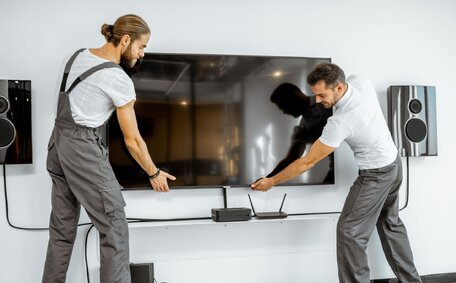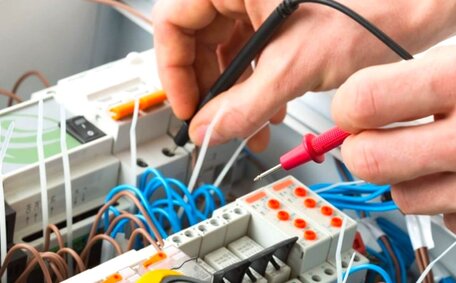
Maintenance Advice for Newly Installed Home Appliances
New appliances need proper care to function efficiently. Discover practical maintenance tips to prolong the life of your home appliances and ensure reliable performance.
Read MoreSevere storms are increasingly leaving a trail of destruction across Australia, and electrical hazards are a major concern. A deadly storm that swept through Victoria earlier this year left 77,000 homes and businesses without power, marking one of the largest outage events in the state’s history.
Tragically, the storm also claimed the life of a dairy farmer in South Gippsland. The Victorian energy minister, Lily D’Ambrosio, called for a national approach to weatherproof Australia’s electricity grid, underscoring the growing frequency and intensity of extreme weather events driven by climate change. This incident is a stark reminder of the vulnerabilities in our infrastructure and the critical need for resilience measures to protect communities.
As Australia grapples with unpredictable weather patterns, the importance of awareness and preparedness has never been greater. Electrical safety during storms is not just a precaution but a necessity to safeguard lives and property.
This blog aims to arm you with vital safety tips for handling electrical appliances during storms. Knowing the risks, such as electrical fires, appliance damage, and potential injuries, empowers you to take proactive measures. Safeguard your home and loved ones with these precautions. Let’s delve into the steps you can adopt to ensure safety during these challenging times.
Storms bring a host of dangers to electrical systems and appliances in Australian homes. Lightning strikes, for instance, can cause power surges that damage essential electrical equipment, including air conditioning units and refrigerators.
When storms or floods expose house electrical wiring to water, it can lead to short circuits, posing risks of electric shock or even electrocution. Furthermore, damaged power lines and cables jeopardize both the safety and functionality of your home’s electrical system.

The unpredictable nature of storms can quickly turn into emergencies, cutting power to homes and damaging crucial appliances. Solar panels, for instance, face risks during extreme weather, as do electrical circuits, power points, and connecting lines, which can interrupt power supply. Awareness of these threats is crucial for taking swift action to protect your home’s electrical system and reduce hazards.
Storms pose significant dangers to electrical systems and appliances in Australian homes. Power surges caused by lightning strikes can damage electrical equipment such as air conditioning units and refrigerators. Water exposure from a storm or flood can lead to short circuits in house electrical wiring, increasing the risk of electric shock or electrocution. Damaged electrical cables and power lines also pose a threat to personal safety and the functionality of the home’s electrical system.
Unpredictable storms can escalate into emergencies, leaving homes without power or causing damage to essential electrical items. For instance, appliances like solar panels and solar power generating systems may sustain damage during extreme weather.
Issues with electrical circuits, power points, and connecting lines can compromise the power supply, necessitating immediate action. By understanding these risks, homeowners can better prepare for and mitigate the effects of storms on their electrical systems.

Disconnect electrical equipment such as televisions, computers, and gaming consoles from power points to prevent damage from power surges. Unplug electrical equipment safely to avoid further risks during storm safety preparations.
Ensure outdoor sockets, electrical cables, and associated wiring are secured or covered to shield them from water damage. Any connection damage to outdoor fixtures can lead to extremely dangerous situations if exposed to water.
Install quality surge protection devices for critical appliances like air conditioning units and refrigerators. This is essential for storm electrical safety, as it can prevent electrical signs of damage caused by voltage spikes. Solar PV systems also benefit from surge protectors to ensure solar PV safety.
Consider using generator power or battery backups during a power outage. Place the generator outdoors and ensure it has a generator change-over switch to connect safely to the home’s electrical system. Check the generator’s load rating and follow the manufacturer’s instructions for safe usage.
Regularly schedule checks with a licensed electrical contractor to confirm that your wiring, circuits, and associated wires are storm-ready. Qualified electricians can also verify the safety switch and overload cut-out switch to ensure your system stays safe during emergencies.
Stay updated through a local radio station for further warnings and advice from the local electricity distribution entity. Awareness of network supply issues or street lights outages can help in anticipating additional challenges.
Ensure fixed telephone lines and other connection points are secure to avoid further damage. Water-damaged equipment and conductive material must be handled carefully to prevent electric shocks or additional hazards.
Following these precautions ensures your home remains as safe as possible during storms, safeguarding both the functionality of your electrical system and the well-being of your household.
Operating appliances like washing machines, microwaves, or dishwashers during storms is risky due to power surges and potential damage to the power circuit. Unplug electrical equipment to ensure electrically safe conditions in your home.
Wired devices, such as desktop computers or fixed telephones, can conduct electricity during storms, posing a risk of electric shocks. Avoid using these devices and ensure safety switches are functioning to protect the electrical system.
Switch off high-power appliances like air conditioning units or heaters. This reduces strain on the power supply and prevents surges from compromising the system’s safety.
Steer clear of using electrical items near damp areas, like windows or doors exposed to rain. Conductive materials in wet conditions can pose serious electric shock risks.
Watch for flickering lights or irregular power supply. These electrical signs may indicate faults in the connecting line or associated wiring. Contact a licensed electrician for verification tests and assistance.
During electrical emergencies, resist the urge to perform your own electrical work. Call emergency services or a qualified electrician for help to ensure safe isolation procedures are followed.

Check electrical items for damage, burnt odours, or unusual noises before reconnecting them to the power point. Damaged appliances may still conduct electricity and require professional inspection.
Standing water near power lines, electrical outlets, or other conductive material poses a serious electrocution hazard. Avoid entering these areas and report hazards to the local electricity distribution entity.
Use circuit breakers or testing devices to ensure power points are functioning correctly. Verification tests by licensed electricians can confirm the safety of the electrical system.
After severe weather, have a licensed electrical contractor inspect your home’s electrical wiring, PV systems, and associated wires. This ensures the system is electrically safe and free from storm damage.
Do not attempt to repair water-damaged appliances. Follow local distribution entity guidelines for safe disposal and avoid using foil insulation or other conductive material with compromised devices.
Prioritising electrical safety during storms is crucial to protecting your loved ones and property. By following the precautions outlined in this blog, you can stay vigilant and prepared during extreme weather events. Electrical safety is about more than safeguarding appliances; it’s about ensuring peace of mind for you and your family.
For professional electrical services during storms or emergencies, trust Bright Force Electrical. Our licensed electricians are available around the clock to ensure your safety and restore your home’s electrical functionality. Don’t take risks with storm-related electrical issues— contact us today for reliable, prompt assistance.
Did you enjoy reading our article “Handling Electrical Appliances During Storms”? We have many related articles you may also be interested in reading, like the below:
New appliances need proper care to function efficiently. Discover practical maintenance tips to prolong the life of your home appliances and ensure reliable performance.
Read MoreGet expert tips on avoiding common hazards like overloaded circuits and faulty appliances. Find out when you need to call a licensed electrician immediately versus contacting your provider. This guide helps you identify true emergencies for safety.
Read MoreUse this comprehensive electrical inspection checklist to keep your new home safe. A professional electrician checks wiring, circuits, appliances and more for hazards that could cause shocks or fires.
Read MoreWe will call back as soon as possible.


